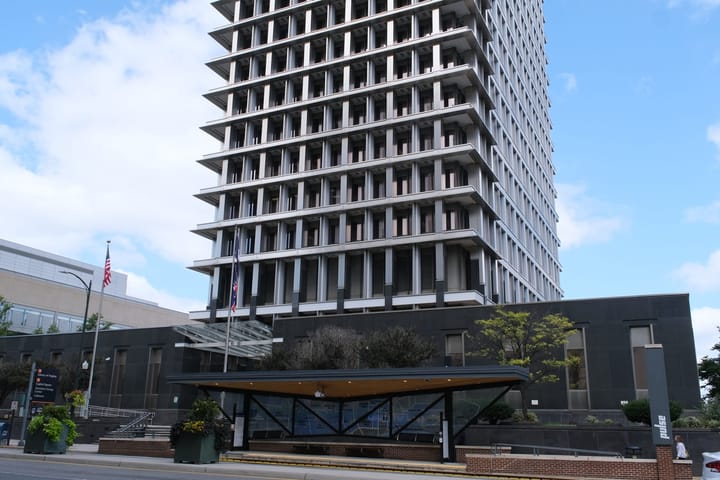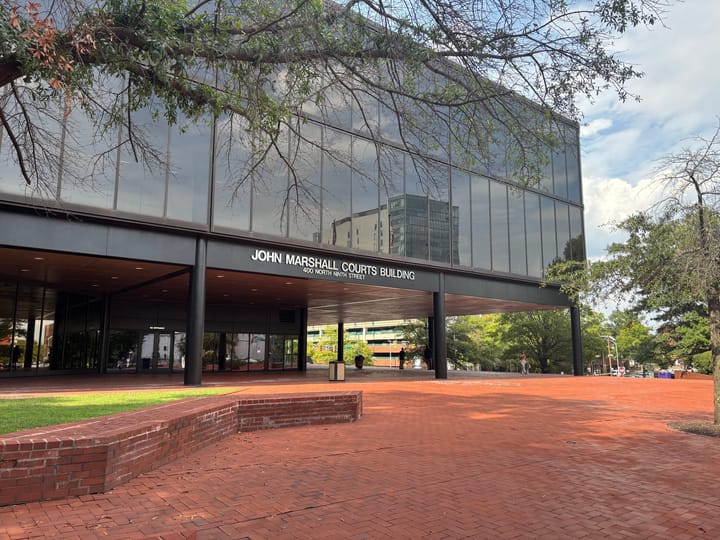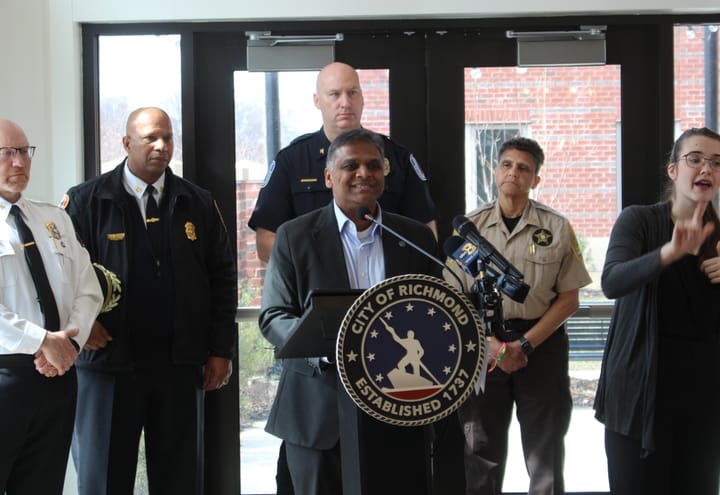
10 takeaways from the new Richmond budget
The Richmond City Council voted 6-2 Monday to pass Mayor Danny Avula’s budget proposal with minimal changes.
The $1 billion general fund budget includes 3.25% raises for city employees, a $9.6 million funding increase for Richmond Public Schools, higher utility bills and no changes to city tax rates.
Jump straight to the takeaways
The new budget plan will take effect July 1 and run through June 30, 2026. The full city budget — which includes capital funding and spending on utilities and other specialized services — is a little more than $3 billion.
“This budget reflects our community’s shared vision for building a stronger, more equitable Richmond. With investments in Richmond Public Schools, housing affordability, and government efficiency, we continue to build on our city’s belief that every resident can thrive,” Avula and Council President Cynthia Newbille (7th District) said in a joint statement after the vote. “We are proud of all the work, input, conversations, and decisioning surrounding the priorities that matter most to Richmond residents.”
The unity expressed in the joint mayoral-council statement glossed over some friction in city government. Two first-term council members said they couldn’t endorse a budget process that, from their perspective, appears designed to minimize meaningful input from the council’s nine members and the constituents they represent.
But several of the six members who voted in favor of the budget said it does a lot of good and makes new investments in core services, even if it falls short of the exact levels of funding that some advocates feel is needed to address the city’s housing affordability problem.
Councilor Katherine Jordan (2nd District) suggested voting no on the budget was self-defeating given all the positive things it does for city residents.
“We are in this together as a city,” said Jordan, the council’s vice president. “I’m so proud to be a Richmonder.”
Councilors Kenya Gibson (3rd District) and Sarah Abubaker (4th District) were the two dissenters.
Even though the budget has some “valuable wins,” Gibson said, Richmonders deserve a more authentic budgeting process at a time when city government is generating headline after headline showing “indisputable dysfunction in our city.”
“We contribute to that dysfunction with a budget process that limits our ability to hear from the public and, ultimately, do our work,” Gibson said.
Abubaker expressed similar frustration, saying her vote was also about the process and shouldn’t be taken as a personal swipe at Avula.
“This is not unique to this administration, “Abubaker said. “Everyone told me this is how it’s done. And that’s exactly the problem.”
Councilor Reva Trammell (8th District) was not present for the budget vote.
Here are some highlights of what the budget will mean for city residents:
1) Bills are going up
The budget doesn’t impose massive new financial burdens on Richmonders, but costs will go up for many city bills.
Increases to utility rates are projected to add about $13 to the average monthly utility bill, and the budget raises fees for recycling, trash pickup and parking.
The budget also anticipates real estate tax bills continuing to grow as property assessments rise. For the next round of assessments in September, officials are projecting 6% growth in taxable real estate value.
2) Tax rates are staying the same
On the campaign trail last year, Avula said the tax burden on Richmonders is heavier due to the city’s land constraints. But he said the city also has to be mindful about staying competitive with lower-tax neighbors like Henrico and Chesterfield counties.
The city budget doesn’t raise tax rates, but it doesn’t lower them either. Keeping the rates unchanged will widen the gap between city tax policy and county tax policy, because both Henrico and Chesterfield adopted budgets this year that lowered their respective real estate tax rates.
The city’s real estate tax rate will remain $1.20 per $100 of assessed value. After a one-cent reduction following years of previous cuts, Chesterfield’s new rate will be 89 cents per $100 of value. Henrico lowered its rate by two cents, setting a new rate of 83 cents per $100 of value.
The counties have also recently pushed to lower their car tax rates, partly in response to spiking prices of used cars caused by pandemic-era disruptions to the auto market. The city has kept its car tax rate unchanged.
3) Some new Avula initiatives got funded
Avula didn’t have a whole lot of financial wiggle room for his first year in office, but the budget allowed the new mayor to put his stamp on City Hall in some small ways.
Perhaps most notably, the budget includes funding for a new chief transformation officer position, a person Avula’s administration has said will “champion a performance management framework to hold city departments accountable to clear metrics.”
The transformation officer hasn’t been hired yet, but that person would presumably work closely with whomever Avula hires to serve as City Hall’s next chief administrative officer. The mayor is expected to make a CAO announcement within the next few weeks.
Avula has also emphasized that the budget includes $50 million for various affordable housing initiatives, a top issue he campaigned on last year.
4) Advocates are applying pressure for more housing aid
Over the course of several public hearings on the budget, advocates from several groups urged policymakers to provide more funding to help some of the city’s neediest residents stay in their homes.
On Monday night, several organizers with the faith-based organization Richmonders Involved to Strengthen Our Communities (RISC) urged the council to boost funding for a program that helps low-income residents make repairs to mobile homes.
“Tonight, if council adopts this budget, you are all complicit in neglecting this urgent community need,” said Keith Hales, a RISC member who attends Second Baptist Church in South Richmond.
Other advocates with progressive group New Virginia Majority pressed for more funding for the city’s Family Crisis Fund, which offers temporary cash assistance to help families stay in their homes and avoid eviction.
“The Family Crisis Fund is an immediate answer to addressing the eviction cases that continue to take a major toll on our most vulnerable communities,” said New Virginia Majority organizer Peter Finn.
The Richmonder is powered by your donations. For just $9.99 a month, you can join the 1,000+ donors who are keeping quality local journalism alive in Richmond.
5) All employees are getting raises
One of the most contentious debates of budget season was whether all city employees should get a 3.25% raise or the city could save money by not pushing top City Hall salaries higher.
Two new council members — Sarah Abubaker (4th District) and Kenya Gibson (3rd District) — suggested scrapping or reducing raises for high-ranking City Hall officials making more than $150,000. That led to a miniature revolt by department directors, many of whom publicly told the council that picking who’s worthy of raises based solely on how much they make would be divisive and bad for morale.
The council ultimately chose to give all employees a raise, which left the legislative body without $750,000 that it could’ve spent elsewhere by forgoing raises for high earners. There was no recorded vote on the topic.
The budget also raises the salary for Avula and all future mayors, bumping it from a little less than $131,000 per year to $175,000.
6) Schools aren’t getting as big a boost as they wanted
Everyone seemed to get the message this wasn’t going to be a year when everything on the budgetary wish list could get funded.
The Richmond School Board still asked for substantially more money, approving a request for $30.8 million in additional funding.
The city budget only included $9.6 million in additional funding, prompting school leaders to look at eliminating vacant positions to make their own budget math work.
7) People’s Budget money was added back in
In 2019, the City Council approved a participatory budgeting program that would give regular city residents a direct say in how $3 million should be spent.
The so-called People’s Budget process is now a reality. But there was an open question about whether the city would actually commit millions to the projects selected by People’s Budget participants.
Avula’s budget didn’t include a specific line item for People’s Budget initiatives, but he said his administration would try to fund as many as possible with existing budget resources. The council added more certainty by allocating $1.7 million for People’s Budget projects, many of which focus on pedestrian safety, planting trees and adding shelters at bus stops.
8) Some policy proposals got nixed
As presented by Avula’s administration, the budget included several policy changes that had only a faint connection to the dollars-and-cents focus of the budget.
The City Council chose to take some of those changes out in favor of having a standalone discussion outside the busy and compressed timelines of budget season.
The proposals stripped from the budget would have weakened city residency rules for top City Hall officials, repealed a rule requiring the city attorney to issue legal opinions in writing and lifted a rule requiring some city job postings to be advertised in the newspaper.
The council signed on repealing an existing city code section that lays out rules for how the city funds local nonprofit groups. A recent audit of that process painted a picture of an arbitrary system where scoring criteria and application deadlines weren’t enforced when groups apply for public funding. Avula has said he intends to overhaul the process moving forward, and wanted to start with a clean slate by repealing the existing one.
9) Council members are still exercising their power to give money to nonprofits
In response to the audit that found a sloppy process for awarding and overseeing public money given to nonprofits, the administration pointed out that council members have the power to grant money to any group they want regardless of any rules City Hall sets.
The council largely proved that point as members introduced several amendments to OK money for private groups that saw funding reduced or eliminated in Avula’s proposed budget.
In one notable example, the council appeared to approve $250,000 for a positive youth development organization called UBU 100, even though the organization didn’t request city funding through the competitive application process other nonprofits go through. City officials later said that, despite appearances to the contrary at a public meeting, the money was not earmarked for the organization and was instead allocated to “life skills” programming.
Some council members have said they don’t think elected politicians should be in the habit of deciding which nonprofits are deserving of taxpayer dollars and which aren’t. Avula has not yet indicated what kind of new process he has in mind for next year.
10) A desire to change the process
Even council members who voted for the budget have expressed interest in reworking the process to give the body more time to seriously consider changes to city spending priorities.
Some characterized it as a little absurd for so much energy to go into debating a few million dollars in the context of a billion-dollar budget.
Councilor Stephanie Lynch (5th District) said it’s highly difficult for the council to change much in a budget that comes from the administration “already baked.”
“If you’re not included in that mayor’s budget, it’s like fighting a gorilla with two hands tied behind your back,” Lynch said.
Some of the council’s ideas for improvement include starting the process earlier, dedicating more time for meetings and work sessions and making sure deadlines for budget amendments are more in sync with the public hearing schedule so residents know what policy options are on the table to support or oppose.
One budget reform proposal has already been introduced, with five of nine members signed on as patrons. That ordinance, which is set for a committee hearing next week, would require the administration to produce side-by-side comparisons for each budget cycle showing how much funding a city department requested and how much money they received in the mayor’s proposal.
The goal of a revamped process, Lynch said, should be to give the council more leeway to “put our money where our hearts are” and respond to the city’s neediest residents.
“The more money and the more funding that we lock up behind these walls and don’t get out into the community, the more they suffer,” she said.
Contact Reporter Graham Moomaw at gmoomaw@richmonder.org






